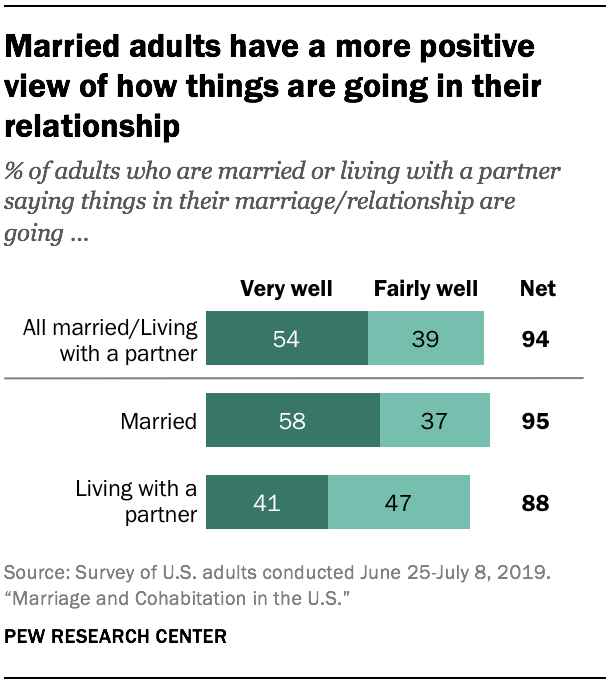 Married adults are more satisfied in general with their relationship than are those who are living with a partner. And they express higher levels of satisfaction with several specific aspects of their relationship. In addition, those who are married are more likely than those who are cohabiting to say they have a great deal of trust in their spouse or partner to be faithful to them, act in their best interest, always tell them the truth and handle money responsibly.
Married adults are more satisfied in general with their relationship than are those who are living with a partner. And they express higher levels of satisfaction with several specific aspects of their relationship. In addition, those who are married are more likely than those who are cohabiting to say they have a great deal of trust in their spouse or partner to be faithful to them, act in their best interest, always tell them the truth and handle money responsibly.
From the division of household chores, to how well their spouse or partner balances work and personal life, to how well they and their spouse or partner communicate, married adults are more likely than cohabiters to say they are very satisfied. The only area where married and cohabiting adults are equally satisfied is in their sex life: Similar shares of both groups (about a third) say they are very satisfied with this aspect of their relationship.
Married adults are also more likely to say their spouse is the adult in their life they feel closest to than those who cohabit are to say the same about their partner; 78% of those who are married say this, compared with 55% of cohabiting adults.
The link between marriage (vs. cohabitation) and more positive assessments of the relationship, higher levels of satisfaction with specific aspects, higher levels of trust and closeness remains after controlling for demographic factors, including gender, age, race, religious affiliation and educational attainment, as well as duration of marriage or cohabitation.
Married and cohabiting adults give similar answers when asked if they or their spouse or partner do more when it comes to household chores and responsibilities, managing household finances and, among parents of children younger than 18, managing the children’s schedule and activities. Among married and cohabiting adults in opposite-sex relationships, women are more likely than men to say they do more than their spouse or partner. In turn, men are more likely to say they do more or that these responsibilities are shared equally.
Married adults are more likely than those living with a partner to say things are going very well in their relationship
Large majorities of U.S. adults who are married or living with a partner say things are going at least fairly well in their relationship, but those who are married are far more likely to say things are going very well. About six-in-ten married adults (58%) say their relationship is going very well, compared with 41% of those living with a partner.
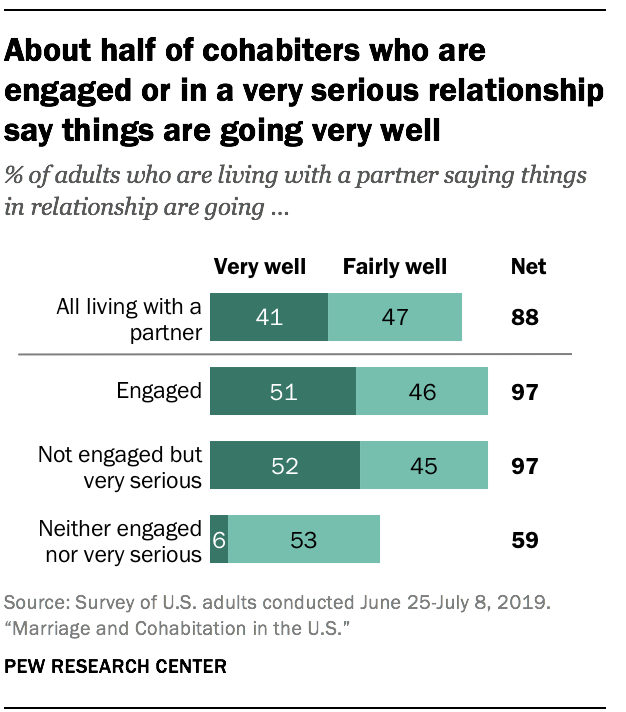 Among cohabiters, about half of those who are engaged to their partners (51%) or who are not engaged but describe their relationship as very serious (52%) say their relationship is going very well. Just 6% of those who are neither engaged nor in a very serious relationship say the same; 53% in this group say things are going fairly well, while 41% say things aren’t going too well or are not going well at all.
Among cohabiters, about half of those who are engaged to their partners (51%) or who are not engaged but describe their relationship as very serious (52%) say their relationship is going very well. Just 6% of those who are neither engaged nor in a very serious relationship say the same; 53% in this group say things are going fairly well, while 41% say things aren’t going too well or are not going well at all.
Assessments of how things are going in their relationship are not related to how long people have been married or living with their partner, and also do not vary significantly by gender or age. Black adults and those without a bachelor’s degree are less likely to say things are going very well in their relationship, but the differences virtually disappear after accounting for the fact that these groups are less likely to be married or, if cohabiting, to be engaged or in a very serious relationship.
For the most part, married adults are more satisfied with specific aspects of their relationship
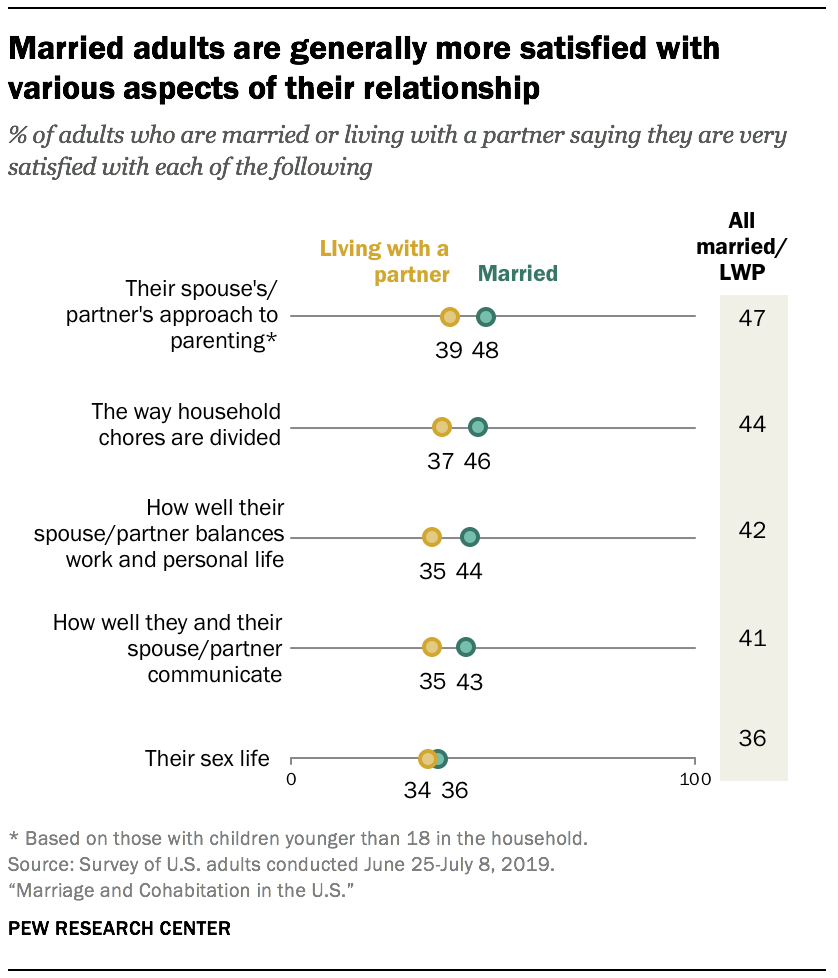 Married adults are more likely than those who are living with a partner to say they are very satisfied with the way household chores are divided between them and their spouse or partner (46% vs. 37%), how well their spouse or partner balances work and personal life (44% vs. 35%) and how well they and their spouse or partner communicate (43% vs. 35%). And, among parents with children younger than 18 in the household, those who are married are more likely than those living with a partner to say they are very satisfied with their spouse or partner’s approach to parenting (48% vs. 39%). When it comes to their sex life, however, similar shares of married (36%) and cohabiting (34%) adults say they are very satisfied.
Married adults are more likely than those who are living with a partner to say they are very satisfied with the way household chores are divided between them and their spouse or partner (46% vs. 37%), how well their spouse or partner balances work and personal life (44% vs. 35%) and how well they and their spouse or partner communicate (43% vs. 35%). And, among parents with children younger than 18 in the household, those who are married are more likely than those living with a partner to say they are very satisfied with their spouse or partner’s approach to parenting (48% vs. 39%). When it comes to their sex life, however, similar shares of married (36%) and cohabiting (34%) adults say they are very satisfied.
Married men (51%) are more likely than married women (40%) to say they are very satisfied with the way household chores are divided between them and their spouse. And among married fathers, 56% say they are very satisfied with their spouse’s approach to parenting, compared with 42% of married mothers. In turn, married women (39%) are more likely than married men (33%) to say they are very satisfied with their sex life.
Younger married adults are more likely than older married adults to say they are very satisfied with their sex life: 45% of married adults younger than 30 are very satisfied with this aspect of their relationship, compared with 37% of those ages 30 to 49 and 34% of those 50 and older. For the most part, there are no gender or age differences among cohabiters in how they rate this or other aspects of their relationship. The only exception is in views of how household chores are divided between them and their partner: 56% of cohabiters ages 50 and older are very satisfied, compared with about three-in-ten of those younger than 50.
Married adults generally trust their spouse more than cohabiters trust their partner
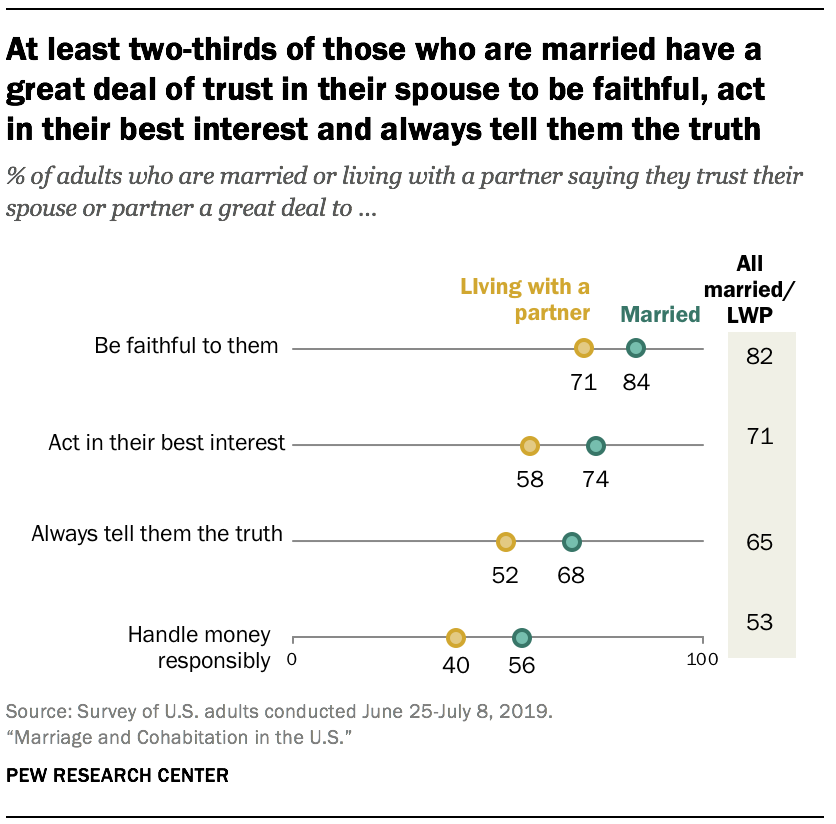 The survey also asked married and cohabiting adults how much they trust their spouse or partner to be faithful to them, act in their best interest, always tell them the truth and handle money responsibly. In each of these areas, majorities of about three-quarters or more say they trust their spouse or partner at least a fair amount. But more say they have a great deal of trust in their spouse or partner to be faithful to them than say the same about each of the other three areas. Conversely, smaller shares express a great deal of trust in their spouse or partner to handle money responsibly than to always tell them the truth, act in their best interest or be faithful. Among married and cohabiting adults, those ages 50 and older are more likely than those younger than 50 to have a great deal of trust in their spouse or partner to handle money responsibly.
The survey also asked married and cohabiting adults how much they trust their spouse or partner to be faithful to them, act in their best interest, always tell them the truth and handle money responsibly. In each of these areas, majorities of about three-quarters or more say they trust their spouse or partner at least a fair amount. But more say they have a great deal of trust in their spouse or partner to be faithful to them than say the same about each of the other three areas. Conversely, smaller shares express a great deal of trust in their spouse or partner to handle money responsibly than to always tell them the truth, act in their best interest or be faithful. Among married and cohabiting adults, those ages 50 and older are more likely than those younger than 50 to have a great deal of trust in their spouse or partner to handle money responsibly.
Married adults are more likely than those living with a partner to say they have a great deal of trust in their spouse or partner to be faithful to them (84% vs. 71%), act in their best interest (74% vs. 58%), always tell them the truth (68% vs. 52%) and handle money responsibly (56% vs. 40%). In each of these areas, married men are more likely than married women to express a great deal of trust in their spouse, although majorities of both do so; no such gender difference is evident among cohabiters.
A majority of married and cohabiting adults say they feel closer to their spouse or partner than to any other adult
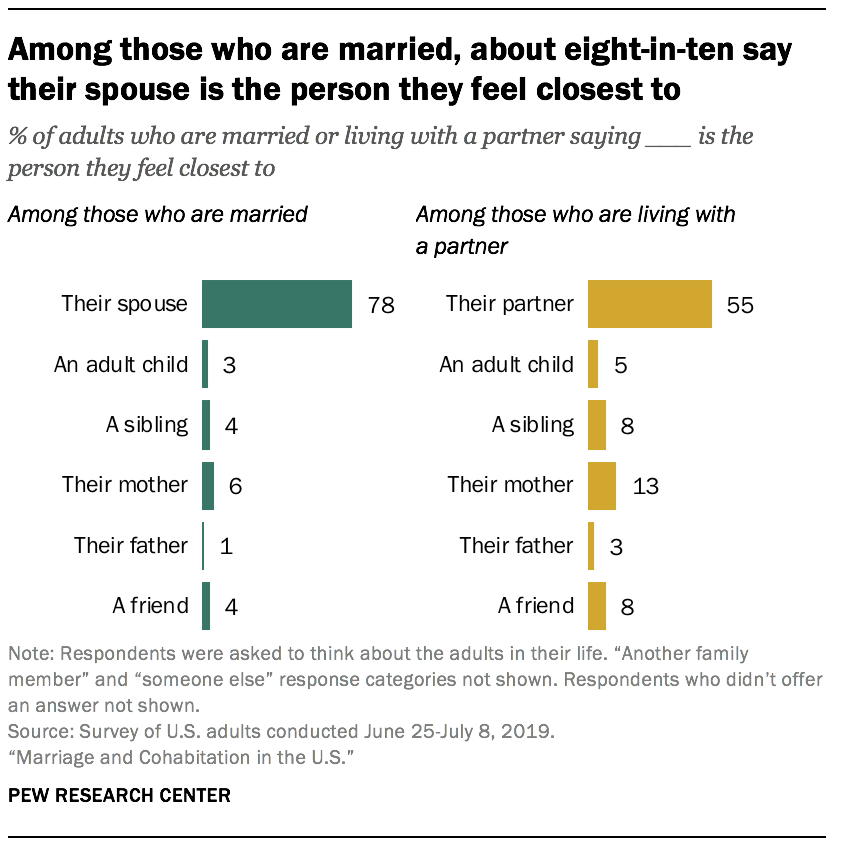 When asked about the adult in their life they feel closest to, about eight-in-ten married adults (78%) name their spouse. A smaller share of cohabiters, though still a majority (55%), say their partner is the person they feel closest to.
When asked about the adult in their life they feel closest to, about eight-in-ten married adults (78%) name their spouse. A smaller share of cohabiters, though still a majority (55%), say their partner is the person they feel closest to.
Cohabiters who are engaged to their partners (65%) or who are not engaged but say their relationship is very serious (63%) are far more likely than those who are neither engaged nor in a very serious relationship (28%) to say they feel closer to their partner than to any other adult. About one-in-five cohabiters who do not describe their relationship as very serious (19%) say a friend is the person they feel closest to, compared with 2% of cohabiters who are engaged and 6% of those who are not engaged but say their relationship is very serious.
Among those who are married to an opposite-sex spouse, men (85%) are more likely than women (70%) to say their spouse is the adult they feel closest to; there is no significant gender gap among those living with a partner.
Large shares of married and cohabiting adults say most people in their family consider their spouse or partner to be part of their family
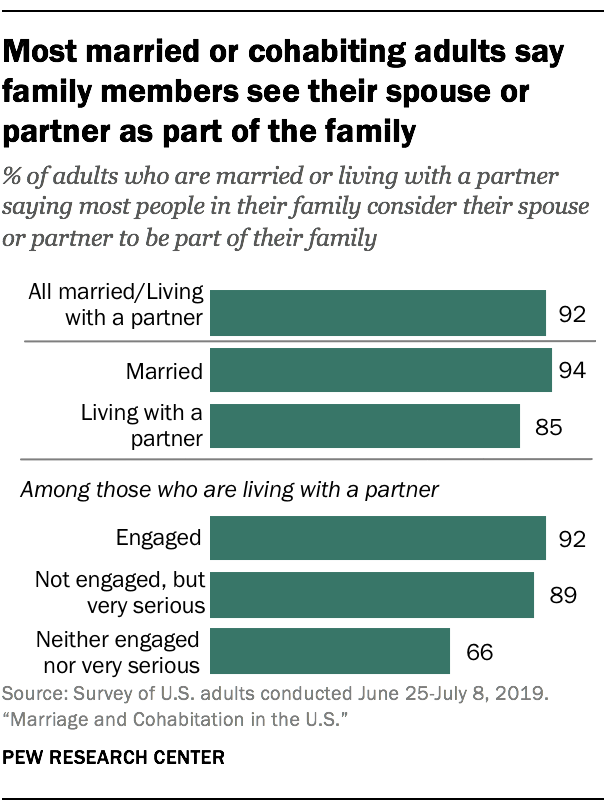 More than nine-in-ten married adults (94%) and 85% of those who are living with a partner say most people in their family would consider their spouse or partner to be part of their family. Cohabiters who are engaged (92%) or who are not engaged but consider their relationship to be very serious (89%) are more likely than those who do not see their relationship as very serious (66%) to say most people in their family see their partner as part of the family.
More than nine-in-ten married adults (94%) and 85% of those who are living with a partner say most people in their family would consider their spouse or partner to be part of their family. Cohabiters who are engaged (92%) or who are not engaged but consider their relationship to be very serious (89%) are more likely than those who do not see their relationship as very serious (66%) to say most people in their family see their partner as part of the family.
Married or cohabiting adults in opposite-sex relationships are more likely than those in same-sex relationships to say most people in their family see their spouse or partner as a member of their family. Still, most adults with same-sex and opposite-sex spouses or partners say most in their family consider that person a member.
Among married and cohabiting adults, perceptions of how household responsibilities are divided vary by gender
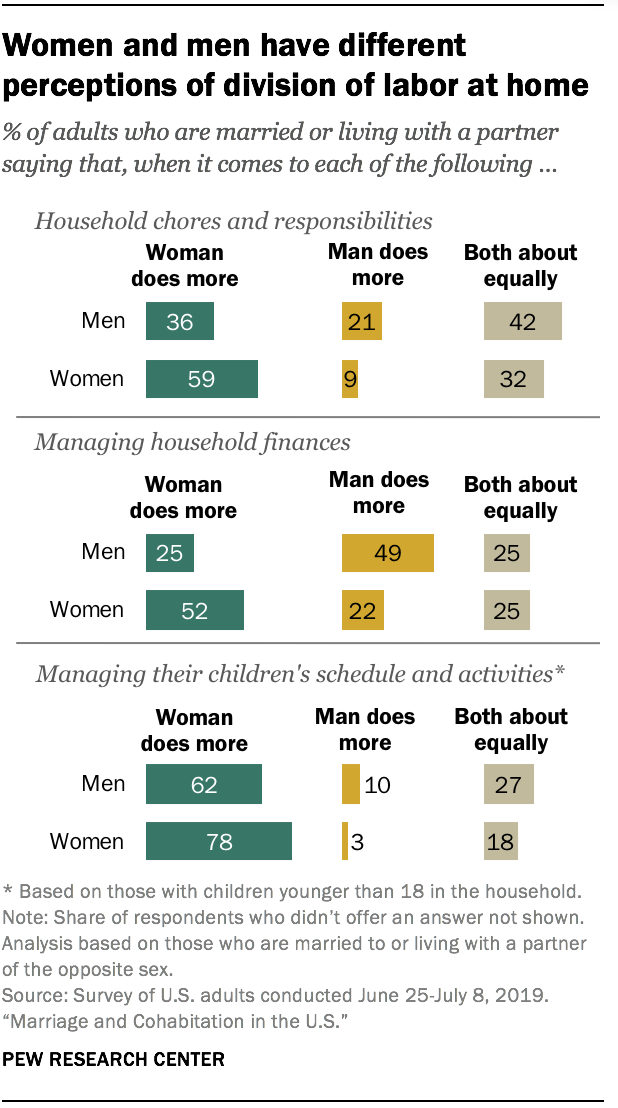 Among married and cohabiting adults in opposite-sex relationships, women are more likely than men to say they do more than their spouse or partner when it comes to household chores and responsibilities, managing household finances and, among parents, managing their children’s schedule and activities. In turn, men are more likely to say they do more than their spouse or partner or that they share responsibilities equally. Views on how responsibilities are shared are similar between those who are married and those living with a partner.
Among married and cohabiting adults in opposite-sex relationships, women are more likely than men to say they do more than their spouse or partner when it comes to household chores and responsibilities, managing household finances and, among parents, managing their children’s schedule and activities. In turn, men are more likely to say they do more than their spouse or partner or that they share responsibilities equally. Views on how responsibilities are shared are similar between those who are married and those living with a partner.
About six-in-ten women in opposite-sex relationships (59%) say they do more than their spouse or partner when it comes to household chores and responsibilities; just 9% say their spouse or partner does more, and 32% say these responsibilities are shared about equally. Among men who are in a relationship with a woman, a plurality (42%) say they and their spouse or partner share these responsibilities about equally, while 36% say their spouse or partner does more and 21% say they do more than their spouse or partner.
When it comes to perceptions of who does more in managing household finances, the views of men and women are near opposites of each other. About half of women who are married to or living with a man (52%) say they do more than their spouse or partner in this area, while 22% say their spouse or partner does more. Conversely, about half of men in opposite-sex relationships (49%) say they do more than their spouse or partner when it comes to managing household finances, while 25% say their spouse or partner does more. A quarter of men and women say this responsibility is shared about equally.
Among married or cohabiting mothers with children younger than 18 in the household, 78% say they do more than their spouse or partner when it comes to managing the children’s schedule and activities; 62% of fathers agree that their spouse or partner does more in this regard.
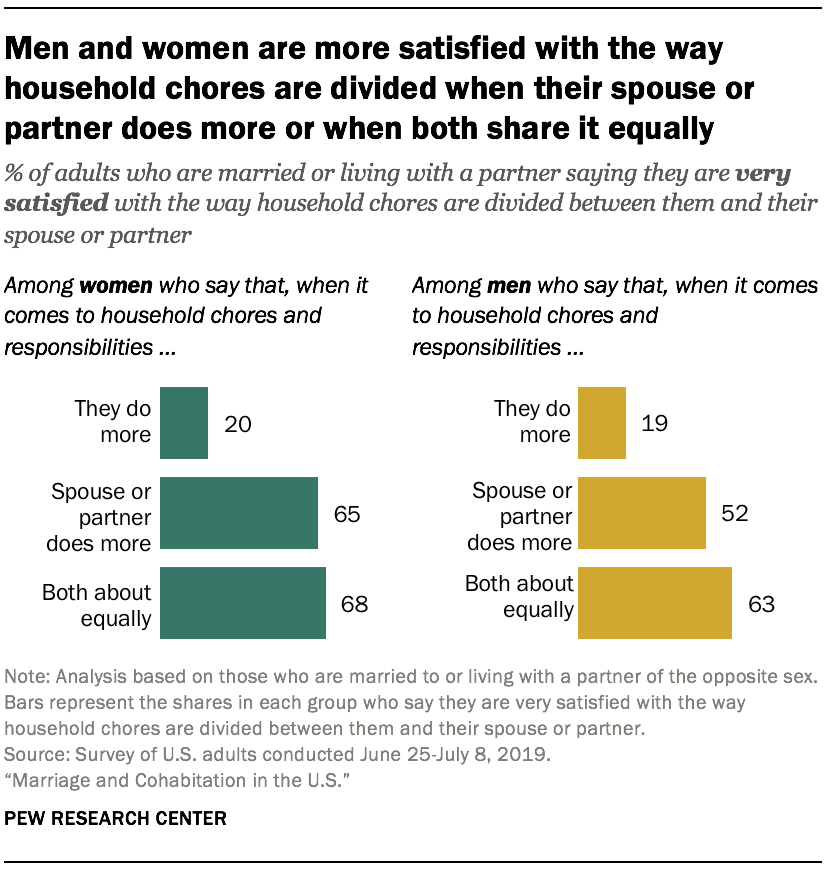 Women who say their spouse or partner does more when it comes to household chores or that they both share these responsibilities about equally are far more likely than those who say they do more to say they are very satisfied with the way chores are divided: 68% of those who say this is divided about equally and 65% of those who say their spouse or partner does more are very satisfied with this aspect of their relationship, compared with 20% of those who say they are mostly responsible for household chores.
Women who say their spouse or partner does more when it comes to household chores or that they both share these responsibilities about equally are far more likely than those who say they do more to say they are very satisfied with the way chores are divided: 68% of those who say this is divided about equally and 65% of those who say their spouse or partner does more are very satisfied with this aspect of their relationship, compared with 20% of those who say they are mostly responsible for household chores.
Men are more likely to be very satisfied with the way things are going in this regard when chores are divided about equally; 63% of men who say chores are divided about equally are very satisfied with the way chores are divided between them and their spouse or partner, compared with 52% of men who say their spouse or partner does more and 19% of those who say they do more.


